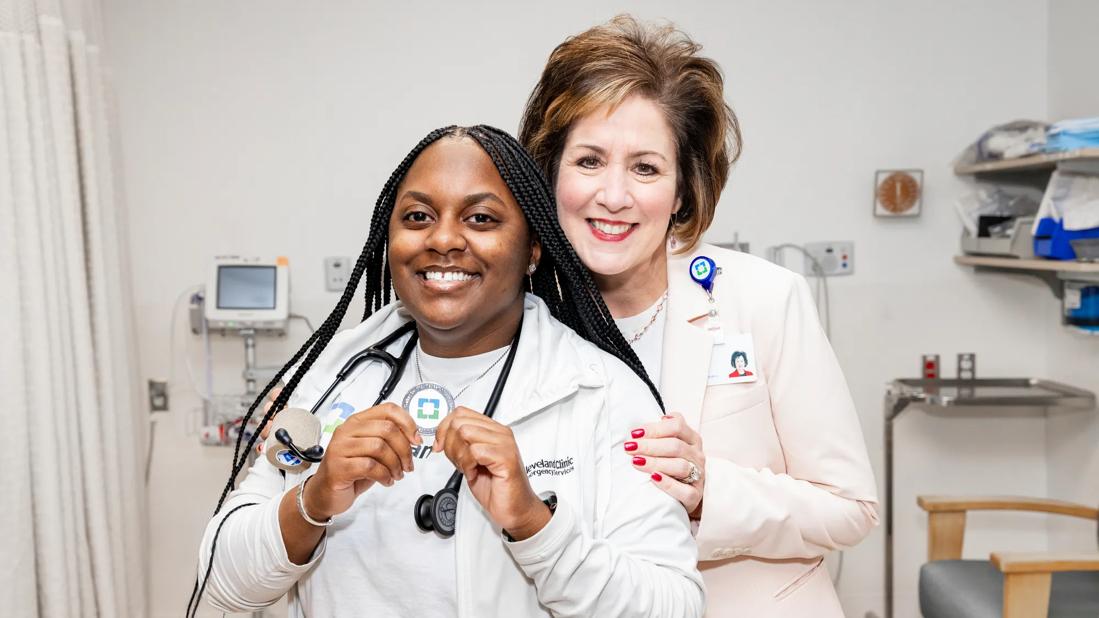
Six months ago, Cleveland Clinic announced the appointment of K. Kelly Hancock, DNP, RN, NE-BC, FAAN, to the health system’s first-of-its-kind position of Chief Caregiver Officer (CCO).
In her unique role, Dr. Hancock serves as the executive leader for both the Zielony Nursing Institute and Human Resources (HR), overseeing Cleveland Clinic’s 70,000 U.S. and international employees. She is focused on aligning all aspects of caregiver engagement and ensuring a unified approach to caregiver needs and workforce experience to enable superior patient care delivery across the globe.
Advertisement
Cleveland Clinic is a non-profit academic medical center. Advertising on our site helps support our mission. We do not endorse non-Cleveland Clinic products or services. Policy
In this interview, Dr. Hancock explains Cleveland Clinic’s new Caregiver Office and her CCO role, shares her top priorities for 2021, and offers her thoughts on why caregivers enjoy working at Cleveland Clinic.
Q: What are your primary responsibilities as Chief Caregiver Officer?
A: In alignment with Cleveland Clinic’s four guiding principles of caring for patients, caring for caregivers, caring for the organization fiscally and caring for the community, my role as Chief Caregiver Officer is focused on Cleveland Clinic’s caregivers.
As a health system, Cleveland Clinic is looking to strengthen its culture and unique team-based approach to healthcare to continue to position the organization as the best place to work in healthcare. My responsibilities are to enhance the health system’s culture, build and retain exceptional caregiver teams through the optimization of HR policies and programs, and provide strategic direction and expertise for the human resources function, both domestically and internationally. My vision is to lead, develop and implement an enhanced level of employee engagement at Cleveland Clinic that is co-created in partnership with the rest of my Caregiver Office colleagues and includes thoughts and insight from all Cleveland Clinic caregivers.
Q: What is the overall mission of Cleveland Clinic’s Caregiver Office?
A: The one thing that continues to drive Cleveland Clinic’s healthcare professionals forward in their work is culture, including how happy and engaged they are each day. The mission of the Caregiver Office is to achieve and maintain a high level of caregiver engagement and ensure caregivers know they and their contributions are always valued. The Caregiver Office is an entire team envisioning what we can do to invest in caregivers and serve as good stewards in the community.
Advertisement
As we grow and develop the office, we proudly announce new caregivers to our team, such as our first Chief of Workforce Strategies and Associate Chief Caregiver Officer, Chad Minor, MBA, FACHE. Chad collaborates closely with me, leading strategic workforce planning, productivity, optimization, analytics and remote workforce solutions, as well as the operations and business functions of the office. He is an incredible asset to our team and has helped Cleveland Clinic achieve many notable goals throughout his career, including reducing care costs, responsibly growing and developing as an organization, and more.
One example of an initiative we are currently working on is designing workforce strategies that will help members of our communities become employed at our organization, if desired, through positions that are personally and professionally fulfilling, and where their contributions will be most valued.
Q: As we begin a new year, what are some of your top priorities?
A: Across the board, caregiver wellness and resiliency will be top priorities. Our organization has well-established practices and strategies to support caregivers, particularly during this time of COVID-19, but we know that moving forward we have to partner with employees to see what else we need to put in place to support them.
One of our primary goals is to provide the tools and resources each employee needs so they can be their true and best self when they come to work to care for patients. We know wellness and resiliency look different for individual caregivers, yet there are commonalities.
Advertisement
For example, we are always thinking about burnout and what risks we need to mitigate. When we think very proactively about wellness for our caregivers beyond traditional wellness programs, there is a lot of opportunity to provide a stronger strategy that better supports a culture of health and wellness.
Q: How will you measure the success of the Caregiver Office this year?
A: There are several standardized ways we will measure the impact of the Caregiver Office. We will use methods such as caregiver engagement surveys and feedback from listening sessions and leadership rounds. We will keep a close eye on notable metrics such as caregiver productivity, improved retention and decreased turnover – specifically with caregiver positions that have historically had higher turnover. We will also consider other variables such as the time it takes to fill caregiver roles that are typically harder to fill.
Q: Why do you think caregivers enjoy working at Cleveland Clinic?
A: Cleveland Clinic’s team-based culture has been connected to the mission of the organization since the beginning – 100 years ago – when Cleveland Clinic was founded in 1921. Our caregiver teams build meaningful connections with one another and we place great emphasis on recognizing the value of every caregiver and promoting that value within the culture of the organization.
Advertisement
Advertisement

Making a difference by putting empathy into action

A look at how personal stories sparked an enterprise-wide cultural reset

Interdisciplinary program fosters high-performance teams

1:1 guidance benefits individuals and organization

Strategies for building connections, staying present

Annual event galvanizes leaders and inspires excellence

Expert tips from Cleveland Clinic’s Chief Legal Officer

Groups move the metrics in environmental services and sterile processing